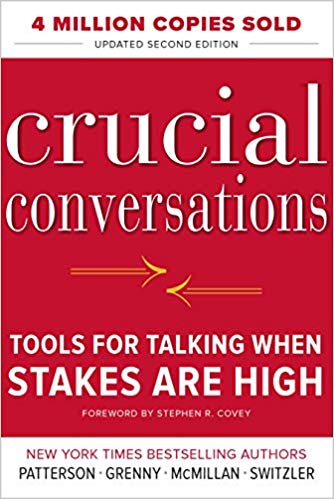

This article is an excerpt from the Shortform summary of "Crucial Conversations" by Kerry Patterson. Shortform has the world's best summaries of books you should be reading.
Like this article? Sign up for a free trial here .
Are you looking for information on how to control your emotions during a difficult conversation? Can we control our emotions?
Life is filled with difficult conversations. Learning how to control your emotions during a difficult conversation can help you have more productive conversations, and build skills for the long run.
How to Control Your Emotions During a Difficult Conversation
By learning how to control your emotions during a difficult conversation, you’ll be in a better position to use the tools discussed so far (dual processing, contrasting, creating mutual purpose, etc.) to have successful crucial conversations.
Getting a better understanding of how emotions work is the first step. When we lose our cool we tend to blame others for pushing our buttons or making us mad. But we’re the drivers of our emotions, which in turn drive our actions. Understanding how to control your emotions during a difficult conversation can help everyone involved make better choices.
Emotions don’t just happen. Here are two truths about them:
- Emotions aren’t forced upon you by others. Others don’t make you mad; you make yourself mad. You create your own emotions — you make yourself angry, insulted, or frustrated.
- Once you’ve created your emotions, you can do one of two things: Rethink them or be driven by them to act in unproductive ways. To put it another way, you either control your emotions, or you’ll be controlled by them.
Here’s an example of how emotions can lead to unproductive behavior. Maria is a copywriter who worked with her boss, Louis, on a project, which they were supposed to present jointly. But Louis presented the entire project himself without giving Maria a chance to speak. She’s angry and resentful, and she feels betrayed. Nonetheless, she doesn’t want to come across as oversensitive, so she doesn’t tell Louis she’s upset. Instead, she erupts occasionally with sarcasm (masking) and cheap shots (avoiding), which is jeopardizing their working relationship.
Maria’s story illustrates some of the pitfalls of not controlling your emotions. If you don’t control your emotions, matters will get worse. On the other hand, if you suppress them, they’ll still surface, for instance through sarcasm or body language. Either way, you’re being held hostage or driven by your emotions, which makes conversation impossible. But can we control our emotions? Crucial Conversations says we can.
You Can Change Your Emotions
When you have strong feelings, you can influence and often change them by thinking through them. Choosing different emotions makes it possible to then choose behaviors that lead to better results, and can help you understand how to control your emotions during a difficult conversation.
When you’re in an emotional state, it’s not easy to mentally reboot to regain control. To do it, you need to understand how feelings develop.
First, there’s a trigger (often something someone else says or does) to which we respond emotionally, with worry or by feeling hurt, etc. Our feelings then drive us to action (for instance, to silence or cheap shots). We go from trigger to feelings to action.
But someone’s actions alone can’t cause our emotional reactions. When faced with the same circumstances, different people have different emotional responses. What makes the difference is that after we see what someone did and before we react emotionally to it, we tell ourselves a story to interpret what we saw. This creates our emotions. Our Path to Action is: We see and hear something. We tell ourselves a story about it. We feel. We act.
Since we are the one telling the story, we can take back control of our emotions by telling ourselves a different story.
Working With Your Emotions
Learning how to control your emotions during a difficult conversation is an ongoing process. For successful crucial conversations, we must:
- Share our unique information.
- Get others to share their information.
- Make it safe to discuss controversial matters.
- Amass a shared pool of information.
Fortunately, dialogue skills are learnable. When you develop the skills to master crucial conversations you can transform them from upsetting events to productive discussions.
But can we control our emotions? Crucial Conversations gives tools to be able to do just that. It says:
- Identify your conversation style when stressed.
- Control your emotions.
- Watch for and catch dialogue-ending problems before they get out of hand.
- Create safe conditions for dialogue.
- Express feedback respectfully.
- Be persuasive, not off-putting.
- Encourage people to share their views.
- Transition from discussion to action.
Learning how to control your emotions during a difficult conversation takes practice and self-awareness. But if you can master how to control your emotions during a difficult conversation, you will have better skills and create better outcomes.

———End of Preview———
Like what you just read? Read the rest of the world's best summary of Kerry Patterson's "Crucial Conversations" at Shortform .
Here's what you'll find in our full Crucial Conversations summary :
- How to approach an argument without getting mad
- The mistakes most people make when trying to listen to someone else
- How to come up with win-win solutions that make everyone happy







Great content. I’m grateful for you to share this knowledge.